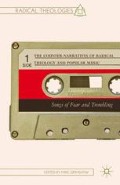Abstract
One of the noteworthy things that Joy Division’s music does is to powerfully resist any transformation into a more positive context. These are not feel-good songs. Their lyrics are relentlessly negative, and culminated in the suicide of the troubled singer, Ian Curtis, on May 18, 1980. The apocryphal slogan “Ian Curtis died for your sins” testifies to the religious significance his music and death possessed for some fans. Curtis hanged himself just before the release of Joy Division’s last album, Closer, and an impending tour of the United States. He was an epileptic, his epilepsy was intensifying, and his marriage was also falling apart. Curtis’s life is seen to imitate his art, where his desperate suicide enacts a disturbing sacrifice that fulfills the prophecy of his deeply pessimistic lyrics.
At the last table, where the camp doctor and the Master-Kalefactress were waiting, the fate of each girl was sealed. There the die was cast as to which of the two sections of the camp she would be sent—Labor Division, or Joy Division.
—Ka-tzetnik 135633, House of Dolls
Access this chapter
Tax calculation will be finalised at checkout
Purchases are for personal use only
Preview
Unable to display preview. Download preview PDF.
Notes
Robert A. Orsi, Between Heaven and Earth: The Religious Worlds People Make and the Scholars Who Study Them (Princeton: Princeton University Press, 2005), p. 179.
See Friedrich Nietzsche, Beyond Good and Evil, trans. Walter Kaufmann (New York: Random House, 1966), p. 157, p. 91.
Peter D. Hershock, Reinventing the Wheel: A Buddhist Response to the Information Age (New York: State University of New York Press, 1999), p. 79.
Michel Foucault, Discipline and Punish: The Birth of the Prison, trans. Alan Sheridan (New York: Vintage Books, 1977), p. 304.
Quoted in Ronald Wright, Stolen Continents: The Americas through Indian Eyes since 1492 (New York: Houghton Mifflin Company, 1992), p. 288.
See Antonin Artaud, “To Have Done With the Judgment of God” in Artaud, Selected Writings, ed. Susan Sontag (Berkeley: University of California Press, 1988).
Gilles Deleuze, “To Have Done with Judgment” in Essays Critical and Clinical, trans. Daniel W. Smith and Michael A. Greco (Minneapolis: University of Minnesota Press, 1997), p. 128.
Editor information
Copyright information
© 2014 Mike Grimshaw
About this chapter
Cite this chapter
Crockett, C. (2014). In the Colony with Joy Division. In: Grimshaw, M. (eds) The Counter-Narratives of Radical Theology and Popular Music. Radical Theologies. Palgrave Macmillan, New York. https://doi.org/10.1057/9781137394118_3
Download citation
DOI: https://doi.org/10.1057/9781137394118_3
Publisher Name: Palgrave Macmillan, New York
Print ISBN: 978-1-349-48381-5
Online ISBN: 978-1-137-39411-8
eBook Packages: Palgrave Religion & Philosophy CollectionPhilosophy and Religion (R0)

